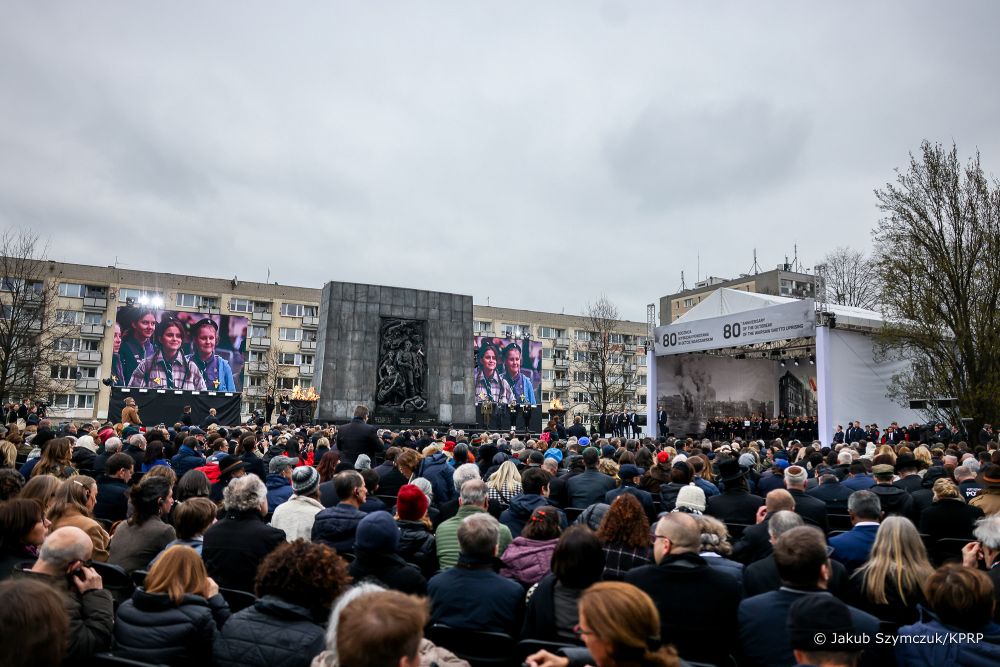- News
- Events
- Oneg Shabbat
- Collections
- Research
- Exhibitions
- Education
- Publishing Department
- Genealogy
- About the Institute
- Bookstore


fot. Jakub Szymczuk / KPRP i Marek Borawski / KPRP
The ceremony began with the joint singing of the Polish anthem, followed by a speech by Prof. Marian Turski, Holocaust survivor, and vice-president of the JHI Association in Poland.
“Our civilization has adopted over a dozen symbols of resistance and heroism”, said Prof. Turski. “I have the right to say that eighty years ago, the insurgents from the Ghetto transformed the streets surrounding us – Gesia, Mila, Niska, Muranowska – into Jewish Thermopylae, they repeated the Jewish Masada, the Jewish Westerplatte. One of the commanders of the Ghetto Uprising, Marek Edelman – I was lucky to know him, I talked to him many times – he often repeated significant words: life is the most important thing. And when you have life, the most important thing is freedom, and often you have to give your life for this freedom.”
Then, the Representative Band of the City of Kiryat Motzkin “Kova tembel” from Israel, prepared by Iris Beit-Halevi Shnajder, the Children’s Choir of the City of Lodz under the direction of Waldemar Sutryka, and the Władysław Skoraczewski Artos Choir at the Grand Theater of the National Opera under the direction of Danuta Chmurska, sang the Jewish partisans’ song Zog nit keyn mol, written in 1943 by the Vilnius poet Hirsz Glik.After listening to the song, the presidents of Poland, Israel, Germany and Warsaw, as well as Ronald Lauder, chairman of the World Jewish Congress, spoke.
“The insurgents of the Warsaw Ghetto are an undying example of bravery and heroism, they are a symbol of courage, dignity, and bravery like lions. We will never forget them,” said the President of the Republic of Poland, Andrzej Duda.
Yitzhak Hercog, the President of Israel, recalled the words of Zivia Lubetkin, a participant in the Warsaw Ghetto Uprising:
“»It was clear that we had no chance of winning in the accepted sense of the word, but we knew that in the end, we would win – we were weak, that was our strength, we believed in justice, we believed in man.« Zivia and her companions were right. Most of the fighters of the Warsaw Ghetto Uprising did not survive, but the human spirit won.”
The President of the Federal Republic of Germany, Frank-Walter Steinmeier, quoted in his speech another heroine of the uprising, Rachela Auerbach, a member of the Oneg Shabbat group, whose letters from the Warsaw Ghetto, edited by Dr. Karolina Szymaniak from the JHI Research Department, were published at the end of 2022 in German translation:
“»With an iron broom, they will sweep out in the first cold days those who are already on the street, who have sold out of warm clothes, and are weak as autumn flies.
The incredible vitality of the Warsaw Jew is useless. They scream and defend themselves to the last hour and minute, but that hour and minute will come« – these words were written down in her diary by Rachela Auerbach, who herself was forced to live in the ghetto. How much pain lies in these few sentences, how much sadness, but also how much composure! Rachela Auerbach knew that the Jews of Warsaw were lost, and it is to her and other people who co-created the Ringelblum archive that we owe our knowledge of the terrible crimes committed here by the Nazis and the memory of the world they annihilated. »The city is being destroyed and the nation is being destroyed,« writes Rachela Auerbach. Terrified, we read about the cruelty experienced by people behind the high walls of the ghetto. This is a report from hell. Terrified, we also read about strength, humanity, and courage, all this was kept by many and even love was in the ghetto, as Marek Edelman told in such a moving way. This is their message to us: preserve the memory and pass it on so that what happened does not happen again.”
“Marian [Turski],” Ronald Lauder went on to say, “we've known each other for forty years. When I first joined you, you were the head of the Jewish Historical Institute. He kept all the records of the Jewish people, alive, and he single-handly made sure that nothing was lost or was given to the Historical Institute against great deal of pressure from the Communist Party".
In his speech, the Mayor of Warsaw, Rafał Trzaskowski, pointed out how integral part of Warsaw was and is its Jewish community:
“This huge tragedy of the Holocaust, the tragedy of the Warsaw Ghetto is also a huge tragedy of Warsaw, my, our beloved city. It’s just a piece of our heart being ripped out. The Germans ripped out a part of our hearts by committing this unheard-of murder. After all that has happened, there is no room for anti-Semitism in Poland, in Europe, or in the world, nor should there be room for intolerance.”
Then the rabbis and clergy – Catholic, Orthodox, and Protestant – said an interreligious prayer, after which the appeal to the memory of the fallen was read out.
At the end of the ceremony, wreaths were laid at the Monument to the Heroes of the Warsaw Ghetto. A wreath from Warsaw’s Jewish organizations was laid by the director of the Jewish Historical Institute, Monika Krawczyk, together with the director of the Warsaw Ghetto Museum, Albert Stankowski, the director of the Polin Museum, Zygmunt Stępiński, and the director of The Social and Cultural Association of Jews in Poland, Artur Hofman.
fot. Jakub Szymczuk / KPRP i Marek Borawski / KPRP
Full text of the speeches delivered during the ceremony: